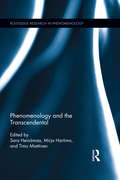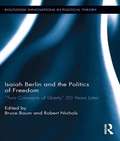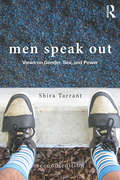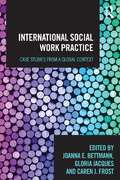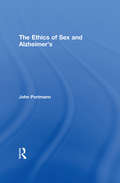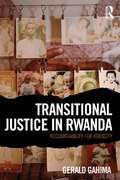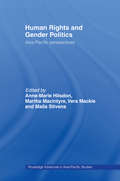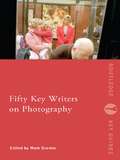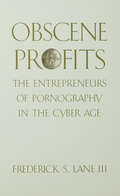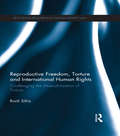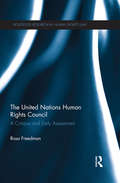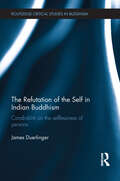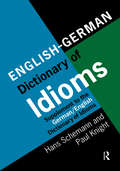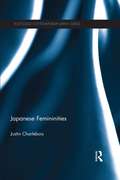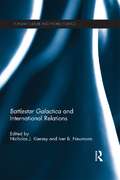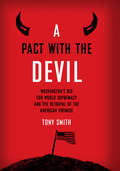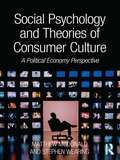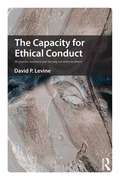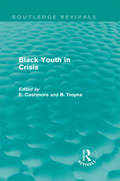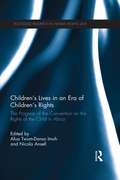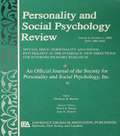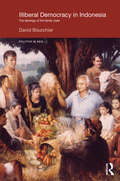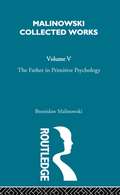Special Collections
Benetech’s Global Certified Accessible Titles
Description: Benetech’s GCA program is the first independent third-party EPUB certification to verify ebook accessibility. By creating content that is born accessible, publishers can meet the needs of all readers. Learn more: https://bornaccessible.benetech.org/
- Table View
- List View
Phenomenology and the Transcendental
by Mirja Hartimo and Sara Heinämaa and Timo MiettinenThe aim of this volume is to offer an updated account of the transcendental character of phenomenology. The main question concerns the sense and relevance of transcendental philosophy today: What can such philosophy contribute to contemporary inquiries and debates after the many reasoned attacks against its idealistic, aprioristic, absolutist and universalistic tendencies—voiced most vigorously by late 20th century postmodern thinkers—as well as attacks against its apparently circular arguments and suspicious metaphysics launched by many analytic philosophers? Contributors also aim to clarify the relations of transcendental phenomenology to other post-Kantian philosophies, most importantly to pragmatism and Wittgenstein’s philosophical investigations. Finally, the volume offers a set of reflections on the meaning of post-transcendental phenomenology.
Isaiah Berlin and the Politics of Freedom
by Bruce Baum and Robert NicholsSince his death in 1997, Isaiah Berlin’s writings have generated continual interest among scholars and educated readers, especially in regard to his ideas about liberalism, value pluralism, and "positive" and "negative" liberty. Most books on Berlin have examined his general political theory, but this volume uses a contemporary perspective to focus specifically on his ideas about freedom and liberty. Isaiah Berlin and the Politics of Freedom brings together an integrated collection of essays by noted and emerging political theorists that commemorate in a critical spirit the recent 50th anniversary of Isaiah Berlin’s famous lecture and essay, "Two Concepts of Liberty." The contributors use Berlin’s essay as an occasion to rethink the larger politics of freedom from a twenty-first century standpoint, bringing Berlin’s ideas into conversation with current political problems and perspectives rooted in postcolonial theory, feminist theory, democratic theory, and critical social theory. The editors begin by surveying the influence of Berlin’s essay and the range of debates about freedom that it has inspired. Contributors’ chapters then offer various analyses such as competing ways to contextualize Berlin’s essay, how to reconsider Berlin’s ideas in light of struggles over national self-determination, European colonialism, and racism, and how to view Berlin’s controversial distinction between so-called "negative liberty" and "positive liberty." By relating Berlin’s thinking about freedom to competing contemporary views of the politics of freedom, this book will be significant for both scholars of Berlin as well as people who are interested in larger debates about the meaning and conditions of freedom.
Men Speak Out
by Shira TarrantMen Speak Out: Views on Gender, Sex, and Power, Second Edition highlights new essays on pornography, pop culture, queer identity, Muslim masculinity, and the war on women. With personal candor and political insight, this collection of diverse authors explores sex work, digital activism, incarceration, domestic violence, surviving incest, and standing firmly as male allies facing the backlash against women's reproductive rights. Featuring eleven new essays and six revised thematic sections, this second edition of a favorite anthology continues to encourage robust discussion and vibrant debate about masculinity and the possibilities for progressive change. The contemporary, compelling essays in Men Speak Out appeal to students, scholars, activists, and everyday readers.
International Social Work Practice
by Joanna E. Bettmann and Gloria Jacques and Caren J. FrostInternational Social Work Practice compares and contrasts divergent social work approaches in countries around the world, providing students with a unique perspective on social work as it is actually practised. Using case studies from frontline practitioners from across the globe, this innovative new textbook stimulates critical thinking about international social work practice issues. Providing a review of both country-specific social work practices and universal social work issues, the text looks at a variety of core social work topics, framed here in terms of CSWE competencies. Set within a theoretical framework presented in the introductory chapter, the subjects covered include: child welfare intimate partner violence family conflict and communication elder care substance abuse trauma. Each chapter presents several case studies exploring range of issues within the broader topic and each case study is commented on by two narratives from social work academics and practitioners from different countries, providing different cultural perspectives. Taking a practical hands-on approach, this text includes a dedicated section for classroom use, with discussion questions, classroom exercises and additional cases for your own analysis. It will be particularly useful to BSW and MSW students taking courses in international social work, practice, social welfare and human behaviour.
The Ethics of Sex and Alzheimer's
by John PortmannA growing epidemic, Alzheimer’s punishes not only its victims but also those married to them. This book analyzes how Alzheimer’s is quietly transforming the way we think about love today. Without meaning to become rebels, many people who find themselves "married to Alzheimer’s" deflate the predominant notion of a conventional marriage. By falling in love again before their ill spouse dies, those married to Alzheimer’s come into conflict with central values of Western civilization – personal, sexual, familial, religious, and political. Those who wait sadly for a spouse’s death must sometimes wonder if the show of fidelity is necessary and whom it helps. Most books on Alzheimer’s focus on those who have it, as opposed to those who care for someone with it. This book offers a powerful and searching meditation on the extent to which someone married to Alzheimer’s should be expected to suffer loneliness. The diagnosis of dementia should not amount to a prohibition of sexual activity for both spouses. Portmann encourages readers to risk honesty in assessing the moral dilemma, using high-profile cases such as Nancy Reagan and Justice Sandra Day O'Connor to illustrate the enormity of the problem. Ideal for classes considering the ethics of aging and sexuality.
Transitional Justice in Rwanda
by Gerald GahimaTransitional Justice in Rwanda: Accountability for Atrocity comprehensively analyzes the full range of the transitional justice processes undertaken for the Rwandan genocide. Drawing on the author’s extensive professional experience as the principal justice policy maker and the leading law enforcement officer in Rwanda from 1996-2003, the book provides an in-depth analysis of the social, political and legal challenges faced by Rwanda in the aftermath of the genocide and the aspirations and legacy of transitional justice. The book explores the role played by the accountability processes not just in pursuing accountability but also in shaping the reconstruction of Rwanda’s institutions of democratic governance and political reconciliation. Central to this exploration will be the examination of whether or not transitional justice in Rwanda has contributed to a foundational rule of law reform process. While recognizing the necessity of pursuing accountability for mass atrocity, the book argues that a maximal approach to accountability for genocide may undermine the promotion of core objectives of transitional justice. Taking on one of the key questions facing practitioners and scholars of transitional justice today, the book suggests that the pursuit of mass accountability, particularly where socio-economic resources and legal capacity is limited, may destabilize the process of rule of law reform, endangering core human rights norms. Moreover, the book suggests that pursuing a strategy of mass accountability may undermine the process of democratic transition, particularly in a context where impunity for crimes committed by the victors of armed conflicts persists. Highlighting the ongoing democratic deficit in Rwanda and resulting political instability in the Great Lakes region, the book argues that the effectiveness of transitional justice ultimately hinges on the nature and success of political transition.
Human Rights and Gender Politics
by Vera Mackie and Martha Macintyre and Anne-Marie Hilsdon and Maila StivensFirst Published in 2004. Routledge is an imprint of Taylor & Francis, an informa company.
Fifty Key Writers on Photography
by Mark DurdenA clear and concise survey of some of the most significant writers on photography who have played a major part in defining and influencing our understanding of the medium. It provides a succinct overview of writing on photography from a diverse range of disciplines and perspectives and examines the shifting perception of the medium over the course of its 170 year history. Key writers discussed include: Roland Barthes Susan Sontag Jacques Derrida Henri Cartier-Bresson Geoffrey Batchen Fully cross-referenced and in an A-Z format, this is an accessible and engaging introductory guide.
Obscene Profits
by Frederick S. LaneSex sells. Already a ten-billion dollar business-and growing-most sex businesses require relatively low start-up costs and minimal equipment. No wonder retired porn stars, homemakers, college students, and entrepreneurs of every stripe are eager to jump on the smut band wagon. Following the money trail, or in this case, the telecom routes, the author reveals how some big phone companies are cashing in too. Obscene Profits offers a startling and entertaining new look at this very old business, and shows why pornography, in all of its variations--videos, magazines, phone-sex, spy cameras, etc.-- is one of the most profitable and popular new careers to come out of the electronic age.
Reproductive Freedom, Torture and International Human Rights
by Ronli SifrisThis book contributes to a feminist understanding of international human rights by examining restrictions on reproductive freedom through the lens of the right to be free from torture and other cruel, inhuman or degrading treatment. Ronli Sifris challenges the view that torture only takes place within the traditional paradigm of interrogation, punishment or intimidation of a detainee, arguing that this traditional construction of the concept of torture prioritises the experiences of men over the experiences of women given that the pain and suffering from which women disproportionately suffer frequently occurs outside of this context. She does this by conceptualising restrictions on women’s reproductive freedom within the framework of the right to be free from torture. The book considers the gendered nature of international law and the gender dimensions of the right to be free from torture. It examines the extension of the prohibition of torture to encompass situations beyond the traditional detainee context in recent years to encompass situations such as rape and female genital mutilation. It goes on to explore in detail whether denying access to abortion and involuntary sterilization constitutes torture or other cruel, inhuman or degrading treatment under international law. The book looks at whether limitations on reproductive freedom meet the determining criteria of torture which are: severe pain or suffering; being intentionally inflicted; being based on discrimination; linked in some way to a State official; whether they constitute lawful sanctions; and the importance of the concept of powerlessness. In doing so the book also highlights how this right may be applicable to other gender-based abuses including female genital mutilation, and how this right may be universally applied to allow women worldwide the right to reproductive freedom.
The United Nations Human Rights Council
by Rosa FreedmanThe United Nations Human Rights Council was created in 2006 to replace the UN Commission on Human Rights. The Council’s mandate and founding principles demonstrate that one of the main aims, at its creation, was for the Council to overcome the Commission’s flaws. Despite the need to avoid repeating its predecessor's failings, the Council’s form, nature and many of its roles and functions are strikingly similar to those of the Commission. This book examines the creation and formative years of the United Nations Human Rights Council and assesses the extent to which the Council has fulfilled its mandate. International law and theories of international relations are used to examine the Council and its functions. Council sessions, procedures and mechanisms are analysed in-depth, with particular consideration given to whether the Council has become politicised to the same extent as the Commission. Whilst remaining aware of the key differences in their functions, Rosa Freedman compares the work of the Council to that of treaty-based human rights bodies. The author draws on observations from her attendance at Council proceedings in order to offer a unique account of how the body works in practice. The United Nations Human Rights Council will be of great interest to students and scholars of human rights law and international relations, as well as lawyers, NGOs and relevant government agencies.
The Refutation of the Self in Indian Buddhism
by James DuerlingerSince the Buddha did not fully explain the theory of persons that underlies his teaching, in later centuries a number of different interpretations were developed. This book presents the interpretation by the celebrated Indian Buddhist philosopher, Candrakīrti (ca. 570–650 C.E.). Candrakīrti’s fullest statement of the theory is included in his Autocommentary on the Introduction to the Middle Way (Madhyamakāvatārabhasya), which is, along with his Introduction to the Middle Way (Madhyamakāvatāra ), among the central treatises that present the Prāsavgika account of the Madhyamaka (Middle Way) philosophy. In this book, Candrakīrti’s most complete statement of his theory of persons is translated and provided with an introduction and commentary that present a careful philosophical analysis of Candrakīrti’s account of the selflessness of persons. This analysis is both philologically precise and analytically sophisticated. The book is of interest to scholars of Buddhism generally and especially to scholars of Indian Buddhist philosophy.
English/German Dictionary of Idioms
by Professor Hans SchemannThis dictionary is the ideal supplement to the German/English Dictionary of Idioms, which together give a rich source of material for the translator from and into each language. The dictionary contains 15,000 headwords, each entry supplying the German equivalents, variants, contexts and the degree of currency/rarity of the idiomatic expression. This dictionary will be an invaluable resource for students and professional literary translators.Not for sale in Germany, Austria or Switzerland
Japanese Femininities
by Justin CharleboisThe corporate salaryman and professional housewife stand as hegemonic archetypes of masculinity and femininity in Japan. However, these rigid gender roles are being challenged by women who are seeking to move beyond the strictly defined confines of their traditional roles as caregivers and homemakers. Through interviews with a range of Japanese women, this book explores how women’s gender roles are both reified and undermined in Japan today, and uncovers the prevalent themes, or ‘discourses’, that are utilized to construct gendered identities. It shows that while dominant discourses formulate notions of femininity within the domestic sphere, these are simultaneously resisted and problematized by contemporary women. To this end, Justin Charlebois traces the construction of different ‘oppositional’ femininities, such as the single career woman and married working mother, which challenge, destabilize, and potentially reconfigure the traditional gender order. This book makes an important contribution to our understanding of gender roles and femininity in Japan, and as such will be of great interest to students and scholars of Japanese culture and society, gender studies and women's studies.
Battlestar Galactica and International Relations
by Iver B. Neumann and Nicholas J. KierseyLooking at a television franchise like Battlestar Galactica (BSG) is no longer news within the discipline of International Relations. A growing number of scholars in and out of IR are studying the importance of cultural artifacts – popular or otherwise – for the phenomena that make up the core of our discipline. The genre of science fiction offers the analyst an opportunity that cannot be matched by more mimetic genres, namely the chance to look at how sets of widely-circulating expectations of the social serve to constrain authors as they work to introduce as yet unexplored problematiques, the fantasy aspect in much of science fiction storytelling is premised simply on a material difference. As such, while the physical setting of a science fiction tale might appear novel, its imaginative life world will likely retain many elements of the world we already live in and which we can readily recognize as similar to our own. For Critical IR scholarship then, BSG presents an opportunity to examine how these purported homologies or elements of redundancy between the fantastic and the real have been drawn and perhaps to consider, too, whether the show can teach us things about world politics, its various logics and structures, which we might not otherwise be sensitive to. Tackling some of the key contemporary issues in IR, the writers of BSG have taken on a range of important political themes and issues, including the legitimacy of military government, the tactical utility of genocide, and even the philosophical implications of artificial intelligence technologies for the very category of what it means to be 'human'. The contributors in this book explore in depth the argument that one of the most important aspects of popular culture is to naturalize or normalise a certain social order by further entrenching the expectations of social behaviour upon which our mentalities of rule are founded. This work will be of interest to student and scholars of international relations, popular culture and security studies.
A Pact with the Devil
by Tony SmithDespite the overwhelming opposition on the left to the war in Iraq, many prominent liberals supported the war on humanitarian grounds. They argued that the war would rid the world of a brutal dictator and liberate the Iraqi people from totalitarian oppression, paving the way for a democratic transformation of the country. In A Pact with the Devil Tony Smith deftly traces this undeniable drift in mainstream liberal thinking toward a more militant posture in world affairs with respect to human rights and democracy promotion. Beginning with the Wilsonian quest to ‘make the world safe for democracy’ right up to the present day liberal support for regime change, Smith isolates leading strands of liberal internationalist thinking in order to see how the ‘liberal hawks’ constructed them into a case for American and liberal imperialism in the Middle East. The result is a reflection on an important aspect of the intellectual history of American foreign policy; establishing how a sophisticated group of thinkers came to fashion their recommendations to Washington and working to see what role liberalism may still play in deliberations in the country on its role in world events now that the failure of these ambitions in Iraq seems clear.
Hans-Georg Gadamer
by Karl SimmsHans-Georg Gadamer’s theory of hermeneutics is one of the most important modern theories of interpretation and understanding, and at its heart is the experience of reading literature. In this clear and comprehensive guide to Gadamer’s thought, Karl Simms: presents an overview of Gadamer’s life and works, outlining his importance to hermeneutic theory and its place in literary studies explains and puts into context his key ideas, including ‘dialogue’, ‘phronēsis’, ‘play’, ‘tradition’, and ‘horizon’ shows how Gadamer’s ideas have been influential in the interpretation of literary texts explains Gadamer’s debates with key contemporaries and successors, such as Habermas, Ricoeur and Derrida provides detailed suggestions for further reading. With a significance that crosses disciplinary boundaries from cultural studies, literary theory and philosophy through to history, music and fine arts, Gadamer’s pioneering work on hermeneutic theory remains of crucial importance to the study of texts in the humanities.
Social Psychology and Theories of Consumer Culture
by Stephen Wearing and Matthew McDonaldSocial Psychology and Theories of Consumer Culture: A Political Economy Perspective presents a critical analysis of the leading positions in social psychology from the perspective of classical and contemporary theories of consumer culture. The analysis seeks to expand social psychological theory by focusing on the interface between modern western culture (consumer culture) and social behaviour. McDonald and Wearing argue that if social psychology is to play a meaningful role in solving some of society’s most pressing problems (e.g. global warming, obesity, addiction, alienation, and exclusion) then it needs to incorporate a more comprehensive understanding and analysis of consumer culture. Wide-ranging and challenging, the book offers a fresh insight into critical social psychology appropriate for upper undergraduate and postgraduate courses in personality, social psychology, critical and applied psychology. It will also appeal to those working in clinical, counselling, abnormal, and environmental psychology and anyone with an interest in the integration of social psychology and theories of consumer culture.
The Capacity for Ethical Conduct
by David P. LevineWhat is the root cause of ethical failure? Why is preoccupation with ethics more a part of the problem than a part of the solution? What makes ethical conduct a natural expression of who we are? What enables us to be ourselves in our relations with others? Ethical failure has become a significant concern in public life, in organizations and in educational institutions. The Capacity for Ethical Conduct explores how qualities of character and personality either make ethical conduct possible for the individual or foster ethical failure. David Levine discusses how ethical conduct is a special way of relating to others, one that secures respect for their integrity by assuring that what they do can express who they are. He argues that this special way of relating to others results not from knowledge of, or a stated commitment to, rules, norms and values, but from the way we experience ourselves, especially from our ability to make a positive emotional investment in being and having a self. Traditionally, emphasis on the importance of values and ethics in shaping conduct tends to be connected to the need to find fault in self and others, fostering an atmosphere where the self is put at risk in its relations to others. This means that an excessive emphasis on ethics, rather than assuring ethical conduct, tends instead to create interpersonal settings marked by emotional assault. Because of this, talk about ethics often expresses ambivalence about ethical conduct, which makes the familiar combination of preoccupation with ethics and ethical failure unsurprising. The Capacity for Ethical Conduct explores the ways in which the interpersonal world of work either fosters a feeling of safety or encourages various forms of emotional assault. Presenting case studes and applying psychoanalytic object relation theory and self psychology, this book explores the factors underlying ethical failure and the capacity for ethical conduct. It will be of interest to scholars and practioners in the fields of psychoanalysis, psychology, philosophy, sociology, organizational dynamics, management and public administration.
Black Youth in Crisis
by E. Cashmore and B. TroynaFirst published in 1982, this book considers the position of young Afro-Caribbean people in Britain, in the 1980s. It looks at how, at the time, this group of young people were disproportionately hit by growing unemployment, seemed to be over-represented in crime statistics and were often disadvantage at school. The authors of the book analyse the struggles of the time and look at the reasons for their existence.
Children's Lives in an Era of Children's Rights
by Nicola Ansell and Afua Twum-Danso ImohThe Convention on the Rights of the Child (CRC), which was adopted unanimously by the United Nations General Assembly in 1989, marked a turning point in the perception of children in international law and policy. Although it was hoped that the Convention would have a significant and positive impact on the lives of all children, this has not happened in many parts of the world. This edited volume, based on empirical research and Non-Governmental Organisation project data, explores the progress of the Convention on the Rights of the Child, and to a lesser extent, the African Charter on the Rights and Welfare of the Child, in nine African countries in the 25 years since it was adopted by the UN General Assembly. The book considers the implementation of the Convention both in terms of policy and practice, and its impact on the lived experiences of children in societies across the continent, focusing on specific themes such as HIV/AIDS, education and disability, child labour, witchcraft stigmatisation, street children, parent-child relationships and child participation. The book breaks new ground in blending legal and social perspectives of the experiences of children, and identifies concrete ways forward for the better implementation of the CRC treaty in the various political contexts that exist in Africa.
Personality and Social Psychology at the Interface
by Julie K. Norem and Marilynn B. Brewer and David A. KennyThis special issue provides a view of the past, present, and future of the field of personality and social psychology as an interdisciplinary endeavor. Collectively, the articles illustrate the vital contributions that can be made pursuing the reciprocal connections between personality/social psychology and psychobiology; developmental psychology; comparative psychology and evolutionary biology; clinical and health psychology; communication studies; organizational studies and systems theory; and cultural anthropology. The papers reflect the collective past and present of the field and set an agenda for a collective future.
Living With Grief
by Kenneth J. DokaLiving With Grief: Children, Adolescents, and Loss, (2000) edited by Kenneth J. Doka, features articles by leading educators and clinicians in the field of grief and bereavement. The chapters entitled "Voices" are the writings of children and adolescents. The book includes a comprehensive resource list of national organizations and a useful bibliography of age-appropriate literature for children and adolescents.
Illiberal Democracy in Indonesia
by David BourchierIlliberal Democracy in Indonesia charts the origins and development of organicist ideologies in Indonesia from the early 20th century to the present. In doing so, it provides a background to the theories and ideology that informed organicist thought, traces key themes in Indonesian history, examines the Soeharto regime and his ‘New Order’ in detail, and looks at contemporary Indonesia to question the possibility of past ideologies making a resurgence in the country. Beginning with an exploration of the origins of the theory of the organic state in Europe, this book explores how this influenced many young Indonesian scholars and ‘secular’ nationalists. It also looks in detail at the case of Japan, and identifies the parallels between the process by which Japanese and Indonesian nationalist scholars drew on European romantic organicist ideas to forge ‘anti-Western’ national identities and ideologies. The book then turns to Indonesia’s tumultuous history from the revolution to 1965, the rise of Soeharto, and how his regime used organicist ideology, together with law and terror, to shape the political landscape consolidate control. In turn, it shows how the social and economic changes wrought by the government’s policies, such as the rise of a cosmopolitan middle class and a rapidly growing urban proletariat led to the failure of the corporatist political infrastructure and the eventual collapse of the New Order in 1998. Finally, the epilogue surveys the post Soeharto years to 2014, and how growing disquiet about the inability of the government to contain religious intolerance, violence and corruption, has led to an increased readiness to re-embrace not only more authoritarian styles of rule but also ideological formulas from the past. This book will be welcomed by students and scholars of Southeast Asia, politics and political theory, as well as by those interested in authoritarian regimes, democracy and human rights.
The Father in Primitive Psychology and Myth in Primitive Psychology
by MalinowskiThis volume investigates ideas, beliefs and sentiments in relation to social organization.
